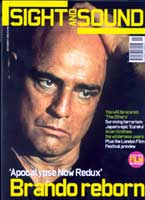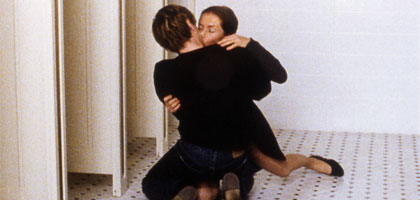
Piano Teacher, The
Austria/France/Germany 2001

Reviewed by Tony Rayns
Synopsis
Our synopses give away the plot in full, including surprise twists.
Pushing 40 and unmarried, Erika Kohut (Isabelle Huppert) teaches piano at the Vienna Conservatoire and is often hard on her pupils. She lives in a relationship of mutual dependence with her domineering mother (Annie Girardot), who wanted her to be a concert pianist; her father is dying in a mental hospital. After hours, while her mother waits for her to come home, Erika visits porno shops and cruises a drive-in cinema to spy on couples having sex in their cars; alone in her bathroom, she mutilates her genitals with a razor blade.
Pushing 30, pianist and ice-hockey enthusiast Walter Klemmer (Benoît Magimel) sets his heart on Erika after seeing her play at a private salon. Despite her hostility, he is accepted as a student in the Conservatoire. When Erika runs to the toilet after maiming the hands of hated pupil Anna Schober (Anna Sigalevitch) by concealing broken glass in her coat pocket, Walter follows her and comes close to raping her. Asserting control, Erika says that they can have a relationship if he obeys the instructions she will give him in a letter.
Soon after, Walter follows Erika home and barges into her bedroom. Erika forces him to read her letter, which contains a list of extreme masochistic demands, and Walter leaves in disgust. Erika tries to apologise by throwing herself at him after an ice-hockey game; he insults and abuses her. He turns up at her flat, locks her mother in the bedroom and batters and rapes Erika. Next day Erika takes a kitchen knife to a concert by Conservatoire students (where she is to stand in for Anna). After seeing Walter with friends, she stabs herself in one shoulder and, unnoticed, leaves.
Review
Elfriede Jelinek's grimly brilliant novel Die Klavierspielerin was published in 1983, long before Jörg Haider's rise in Austrian politics. Narrated in short, urgent sentences in the present tense, the book explores the neuroses of a deeply repressed middle-aged woman on a fast ride to self-destruction. Explores, but declines to explain. According to Michael Haneke, it was precisely the absence of psychological justification that drew him to the book.
Many of the specifics of protagonist Erika Kohut's plight (the specialisation in Schubert and Schumann, the cruel treatment of pupils, the invasion of the men-only porno subculture, the inculcated lack of self-esteem, the underlying need to be wounded) suggest the book should be read as feminist: it's an extremist vision of what it means to lack social, sexual and cultural power. But by making the character a Conservatoire teacher and relating her agony to her feelings for great composers, Jelinek broadens her attack to Austria itself. Using the structures of the 'high culture' industry as a cipher for the state, the novel sees Kohut's masochism as the product of a clearly fascistic system.
Haneke has filmed the text with near-total fidelity, streamlining the sequence of events here, transposing a location there. (The scene in which Kohut urinates in excitement while spying on a copulating couple has been moved from the Prater park to a drive-in cinema, for no obvious reason.) The director prides himself on his objectivity, and so it's a little surprising that some of his aesthetic choices point towards editorial comment. The interpolated top-shots of male hands on the piano keyboard (first in the credits sequence, then later when Kohut delivers her letter of sexual demands to an admirer) insist portentously on a metaphorical dimension. And the audio overlaps of classical music at the beginning and end of Kohut's first visit to the sex shop work too hard to link culture and pornography - unless, of course, they're just reaching for a facile irony. Mostly, though, Haneke is happy to maintain his usual studiously neutral stylistic equanimity in the face of all the bourgeois horror.
To make such an ultra-faithful adaptation of the book in 2001 implies an intention to skewer Haider's Austria, but the film has almost none of the impact of Jelinek's novel - largely because it stars Isabelle Huppert. This is no reflection on Huppert's thespian talents; her aptitude for playing defeated women in Euro art movies has not been in doubt since The Lacemaker (1977), and here she certainly manages to get inside Kohut's self-destructive neuroses, even if her put-downs of hapless pupils have something of the Anne Robinson about them. But her presence makes it impossible to suspend disbelief: it turns what should be a harrowing journey to the end of the night into a parade of perversities which seems increasingly gratuitous and absurd, like some chilly, intellectual rethink of a Ken Russell biopic. To watch Huppert slice her (unseen) labia with a razor blade, sniff used tissues from the bin in a porno-video booth and perform fellatio interruptus in a public toilet has less to do with understanding Kohut than it does with being invited to applaud an actress for her 'daring'. (The performance was duly rewarded by a Cannes jury, itself heavy with 'great actresses'.)
Set in a Vienna where everyone speaks French, this is as much a quintessential Euro art movie as the average Hollywood movie is a commercial entertainment - which perhaps explains why it's too 'nasty' in exactly the same way as, say, Almost Famous is too 'nice'. The conspicuously humourless Haneke started working with stars only in Code Unknown, one film ago, and hasn't yet found a credible way to reconcile his determinedly dark-side view of humanity with his new-found need to attract the mass arthouse audience. He scores in the pairing of Huppert with Annie Girardot as her monstrous mother (their early scenes together sketch a frighteningly plausible symbiotic relationship), but cannot solve the script problem which requires her admirer Klemmer to turn from a promising Schoenberg virtuoso into a woman-battering rapist virtually overnight. And he's defeated by the challenge of making the broken glass/hand-maiming incident convincing physically, never mind psychologically. Overall, the film misses the brilliance of Jelinek's novel by some way. It settles for being merely grim.
Credits
- Director
- Michael Haneke
- Producer
- Veit Heiduschka
- Screenplay
- Michael Haneke
- Based on the novel Die Klavierspielerin by
- Elfriede Jelinek
- Director of Photography
- Christian Berger
- Editor
- Monika Willi
- Art Director
- Christoph Kanter
